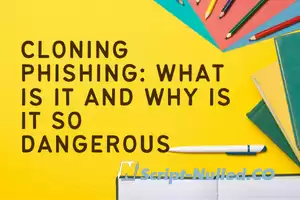
Of all the security threats we can encounter when browsing the Internet, Phishing is undoubtedly one of the worst. It is a method that hackers use to steal passwords and take control of an account. Over time, in addition, they have been perfecting the techniques to manage to attack. In this article we are going to talk about what is cloning phishing. Let's explain what it is and what you can do to avoid being a victim.
What does cloning phishing consist of?
We can say that a Phishing attack it is a strategy that cybercriminals use to scam. For example, they can send an email containing a link to a malicious site, which pretends to be a legitimate page. But when the victim clicks, he is really entering a fake website, where his personal data is in danger.
Now the Phishing may have different variants. Attackers are constantly updated to increase success. One of these options is what is known as cloning Phishing. It is based on cloning previously sent emails. They are going to supplant the identity of an official entity in this way.
What the attacker does is clone an email that the victim has previously received. In this way, if you receive it again, it may not seem strange to you and end up clicking on a link, logging in or sending any type of data that you may request.
For example, let's think of a social network that normally sends an email when we are tagged in a photograph. It is something we are used to and we can click to see that photo. Now what the attacker does is clone just that email. You are going to send an e-mail containing something identical, saying for example that we have been tagged in an image.
But of course, that email is actually fake; As soon as we click on a link we will end up on a fraudulent page and possibly steal the password from that social network or request something. It is a Phishing attack that is going to try to be a clone of a normal, legitimate email that we could receive at any time.
How to detect and avoid clone Phishing
As you can see, the Cloning phishing or clones is more difficult to detect. You will not receive a sporadic message, without much sense, but you will receive something that could really be legitimate at any time. This means that we must take even more precautions to avoid attacks and malware on our systems.
Analyze addresses and links
The first thing you can do is analyze the direction very well email the email you have received. If you suspect it may be a scam but you see that it is really the same as a real email, take a good look at that address. Sometimes a symbol, a letter or anything can vary and that is already a clue that tells you not to open anything that comes to you from that address.
You can also choose analyze links carrying attachments. There are pages like URLVoid or Sucuri that help detect dangerous links. Basically what you do is paste that URL that you have received and use a database to determine if it can contain any threat or nothing happens to access there.
You should keep in mind that the latter is simply one more help. It could be a very recent cloning Phishing and the links have not yet appeared in the databases and, therefore, Those tools would not tell you that this is a scam and you may be in danger if you open it.
Avoid logging in from external links
This tip is to avoid problems with the cloning Phishing. It is important that you avoid logging in from external links that come to you through social networks, mail or any platform. It does not matter if it is an e-mail that you have received and you think is reliable, since you never really know if it can be a scam and better prevent.
Ideally, log in by directly on the website through the browser or by accessing through application. This way you will avoid entering from a link that may be false and could lead to a scam without being aware of it and putting your passwords and personal data at risk.
Do not download suspicious files
Another recommendation is do not download any file or document that arrives through an email that may be suspicious. Hackers can use this strategy to strain viruses and malware in general. Think that simply through a text document or image they could contain malicious software.
So avoid downloading files if you don't know if they really are reliable. This will help you to be more protected from malware and reduce the risk that your computer will malfunction or your personal data may be exposed.
Protect email address
If you want to avoid receiving emails that can be dangerous, such as cloning Phishing, a good idea is protect your email address. What can you do? For example, avoid exposing the address in public forums or comments on web pages that can be seen by anyone.
If you need to register on pages that may not be secure, a good idea is to use disposable emails. In this way you will avoid using the principal and you will not expose your personal data more than necessary. There are many options on the Internet.
Maintain team safety
Furthermore, maintaining team safety will also help avoid problems with cloning phishing and other similar threats. Use a good antivirus, such as Windows Defender or Avast. These types of programs will notify you in case you download any malware or something that may compromise security.
Equally, it is important to have all updated. In the case of Windows, to update the operating system you can go to Start, Configuration and Windows Update. In this way you will always have the latest version available and you can correct certain errors that may appear and that could compromise your privacy.
This is something you should apply no matter what type of operating system you are using. Always update any program you use and thus avoid security problems that may affect you.
In short, as you see cloning Phishing is a major problem that can leave your personal data exposed on the net. It is essential that you take measures to detect it and prevent it from affecting your security and privacy. Have a good antivirus, keep everything updated, but especially keep common sense and don't make mistakes.

 Spain
Spain
 Portugal
Portugal



